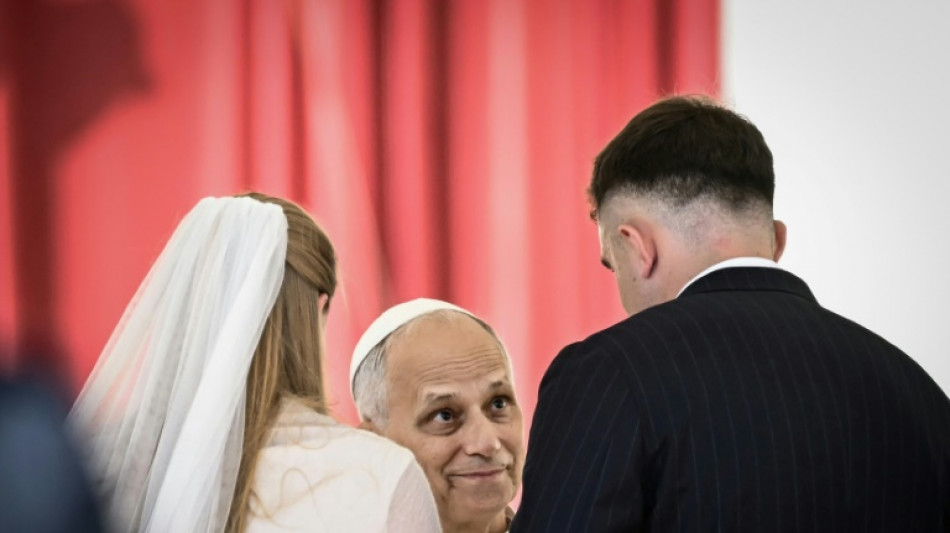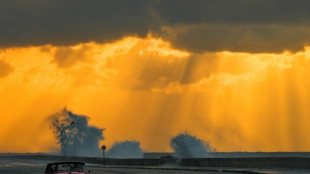
Vatican receives first LGBTQ pilgrimage

In a first for the Vatican, more than a thousand LGBTQ Catholics and their supporters are this weekend holding a pilgrimage, in what they are promoting as an important sign of diversity in the Church.
The gathering, of some 1,400 people from around 20 countries, was part of the Catholic Church's Jubilee holy year. It was organised by La Tenda di Gionata (The Tent of Jonathon), an Italian association lobbying for greater inclusivity among the faithful.
Those taking part were not to have a private audience with Pope Leo XIV.
Even though LGBTQ groups have gone to the Vatican before, this is the first time such a pilgrimage has featured on the official Jubilee programme.
Yveline Behets, a 68-year-old transgender woman from Brussels, walked 130 kilometres (80 miles) with another 30 LGBTQ people along part of the ancient Via Francigena pilgrimage route to get to Rome.
She said she expected more "plurality" from the Church after experiencing difficulties with other Catholics, among whom, she said, she did "not always feel acknowledged".
"One should not misuse the word 'welcome'. We are not just some outsiders who are are welcomed sometimes, or more regularly -- we are part of the same family," she said, wearing a t-shirt with the rainbow of the LGBTQ community.
- Into the Vatican -
Just as millions of other pilgrims have done, those taking part in the LGBTQ pilgrimage were on Saturday to walk up the main road to the Vatican to step through the Holy Door into Saint Peter's basilica.
Saturday morning, hundreds of them took part in a mass in the Church of the Gesu, in the centre of Rome. The evening before they had held a prayer vigil.
Hugo, a 35-year-old from Quebec in Canada who declined to give his last name, said he believed the LGBTQ pilgrimage was "a really important signal for us to feel more included".
He said he hoped it would "let people who are on the fence to allow themselves to be more welcoming towards homosexuals in the Church".
But, in a religious institution that for two millennia has viewed homosexual acts as going against its tenet of procreative sex and gay couples "intrinsically disordered", the road to acceptance is still long.
"There are fears and a sort of misunderstanding when it comes to the life that homosexuals lead," Hugo said. "If everybody got to know everyone else, I think a lot of barriers would come down."
Currently, though, he said "a lot of obstacles remain", especially for couples who wanted the Church's blessing for same-sex marriages.
Pope Francis, who died in April, had sought to make the Catholic Church open to all, and he made many overtures to the LGBTQ community -- without changing the doctrine.
His 2023 decision to allow priests to bless same-sex couples triggered fierce opposition from conservative branches of the Church, particularly in Africa.
- 'Needs to change' -
His successor Pope Leo has said that marriage is a union between a man and a women, but he will not change Francis's decision.
Beatrice Sarti, an Italian accompanying her gay son on the weekend pilgrimage, said there "is still a long way to go", starting with shifting mindsets among Catholics.
"Many of our children no longer go to church... because they are made to feel that they are wrong. That absolutely needs to change," said the 60-year-old from Bologna, who is a member of La Tenda di Gionata.
"The first thing to do is train educators, the seminarians, the priests and the bishops, starting at grassroots," she said, while admitting "it is a very long process".
L.Lefevre--PS

 London
London

 Manchester
Manchester
 Glasgow
Glasgow
 Dublin
Dublin
 Belfast
Belfast
 Washington
Washington
 Denver
Denver
 Atlanta
Atlanta
 Dallas
Dallas
 Houston Texas
Houston Texas
 New Orleans
New Orleans
 El Paso
El Paso
 Phoenix
Phoenix
 Los Angeles
Los Angeles



